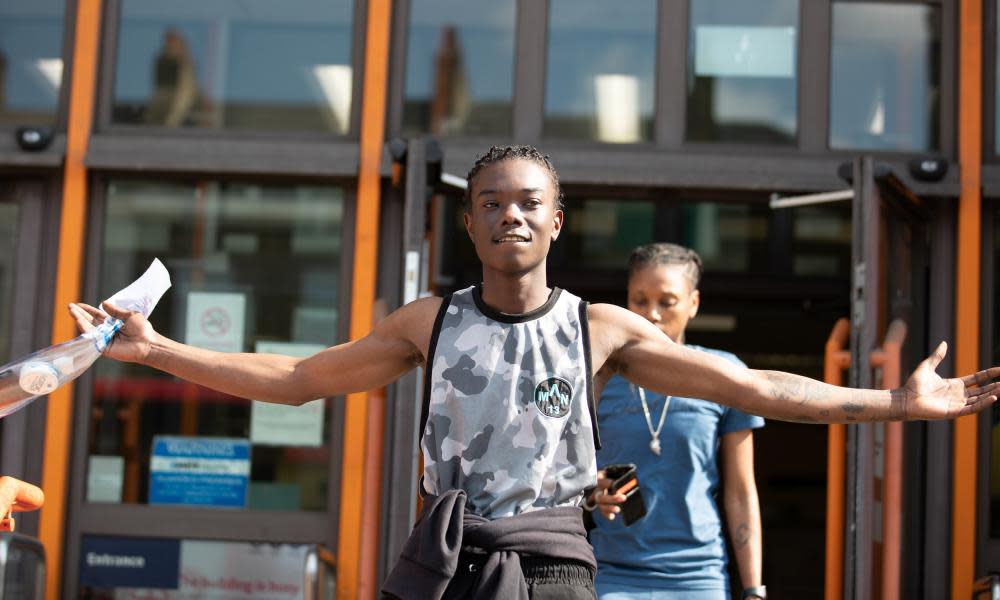The disturbing rise of Mizzy: this is what happens when culture values nothing but attention

When I first came across Mizzy, now infamous as the “TikTok Terror”, it was in videos of him being chased by security after breaking into Alton Towers or riding an electric bike into a Sainsbury’s. He seemed annoying in a “kids these days!” kind of way, and I didn’t think much of it. But fast-forward a few months and Mizzy’s videos – his real name is Bacari-Bronze O’Garro – went to a very dark place indeed. The 18-year-old has provoked outrage for his abhorrent TikTok videos, which have seen him abduct an elderly woman’s dog, attempt to leapfrog over an Orthodox Jewish man, enter a stranger’s home without permission, and walk up to young people at night and ask if they “want to die”. He has since apologised, but you can only imagine the shocking and disturbing effect this “content” must have had on those involved.
Looking back on it, it almost seems as if this escalation in videos was built into the system: illicit bike rides aren’t enough to sustain the internet’s attention, you have to up your prank game and really force people to watch. Now bewildered and angry people across Britain have been understandably left with a series of questions. Namely: who is Mizzy and what does he want?
The reactions have tended to fall into two camps. There seems to be a new story about him every day – each an excuse for people on the internet to shout about how he has not faced enough consequences. But there are also a few welfare-minded folks on social media who view Mizzy as someone more in need of a social worker than a judge.
It’s true that Mizzy is an adult but he is very young, which is worth bearing in mind. At the same time, we should be wary of how we portray him. What both responses fail to take into account is that Mizzy has recognised that, in a competitive market, there is a high demand for content that really aggravates other people – the kids call it “cloutrage”. By pursuing this – in an amoral, algorithmic universe that rewards anything that garners attention – he is engaging in a twisted form of online entrepreneurship. One that could return serious profits through the development of a cult following and core audience.
To be a successful video content creator, particularly one who trades in pranks and aggravation, you have to be willing to push yourself to extremes. In the past, this has typically involved self-humiliation content – think the cinnamon challenge or those disgusting mukbangs (a content genre that originated in South Korea and featured people eating strange foods). Jake Paul, whose net worth is estimated at around $310m (£250m), began his career on Vine, staging juvenile but broadly inoffensive pranks and skits.
What Mizzy has also done is exploit the distinctly British irritation and discomfort with any type of antisocial behaviour by teenagers – he knows exactly what it is that riles British people.
Take his interview with Piers Morgan (it was the most obvious platform for someone seeking the greatest return in the form of attention, opposite a man whose profile is also built off bullish divisiveness). The showdown itself was not exactly great television but I was most struck by the moment Mizzy said to Morgan: “You’re trying to get on to me because I’m black.” Unsurprisingly, it became the most viral clip from the interview.
Does Mizzy really believe he’s receiving this backlash because he’s black? (It isn’t a baseless idea, there is a kind of pervasive “know your place” racism directed against black youth that is inescapable.) What Mizzy surely does know is that “playing the race card” is something that angers the kind of people who watch Piers Morgan like nothing else. In the interview, Mizzy also teases the public about how British laws aren’t strong enough to contain him – a contrarian line that must have both enraged and been music to the ears of Tory authoritarians.
So what can be done about Mizzy? Not a lot, really (as much as everyone on the internet thinks they can change someone’s mind with one firm conversation). But it helps to properly understand him in context: as a cultural figure who has been responding to the incentive structures of a system that many people – adults, that is – have helped build and legitimise.
The fury of the nation might seem a high price to pay, but for Mizzy it’s clearly worth it: as he told Morgan, “Hate brings likes, hate brings views.” I wouldn’t be surprised if he joins the increasing pool of influencers-turned-boxers – I’m sure you’ll soon be able to pay good money to watch him get knocked out, if you really hate him that much. But here’s the catch-22: so long as your eyes are on him, he’ll have won.
Jason Okundaye is a London-based writer and researcher
Do you have an opinion on the issues raised in this article? If you would like to submit a response of up to 300 words by email to be considered for publication in our letters section, please click here.

 Yahoo News
Yahoo News 
